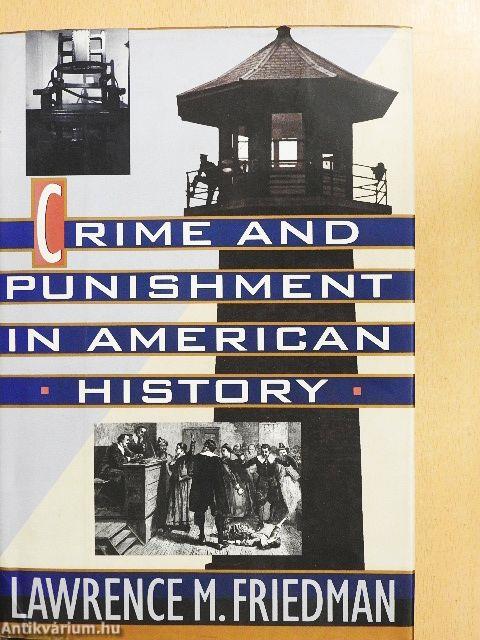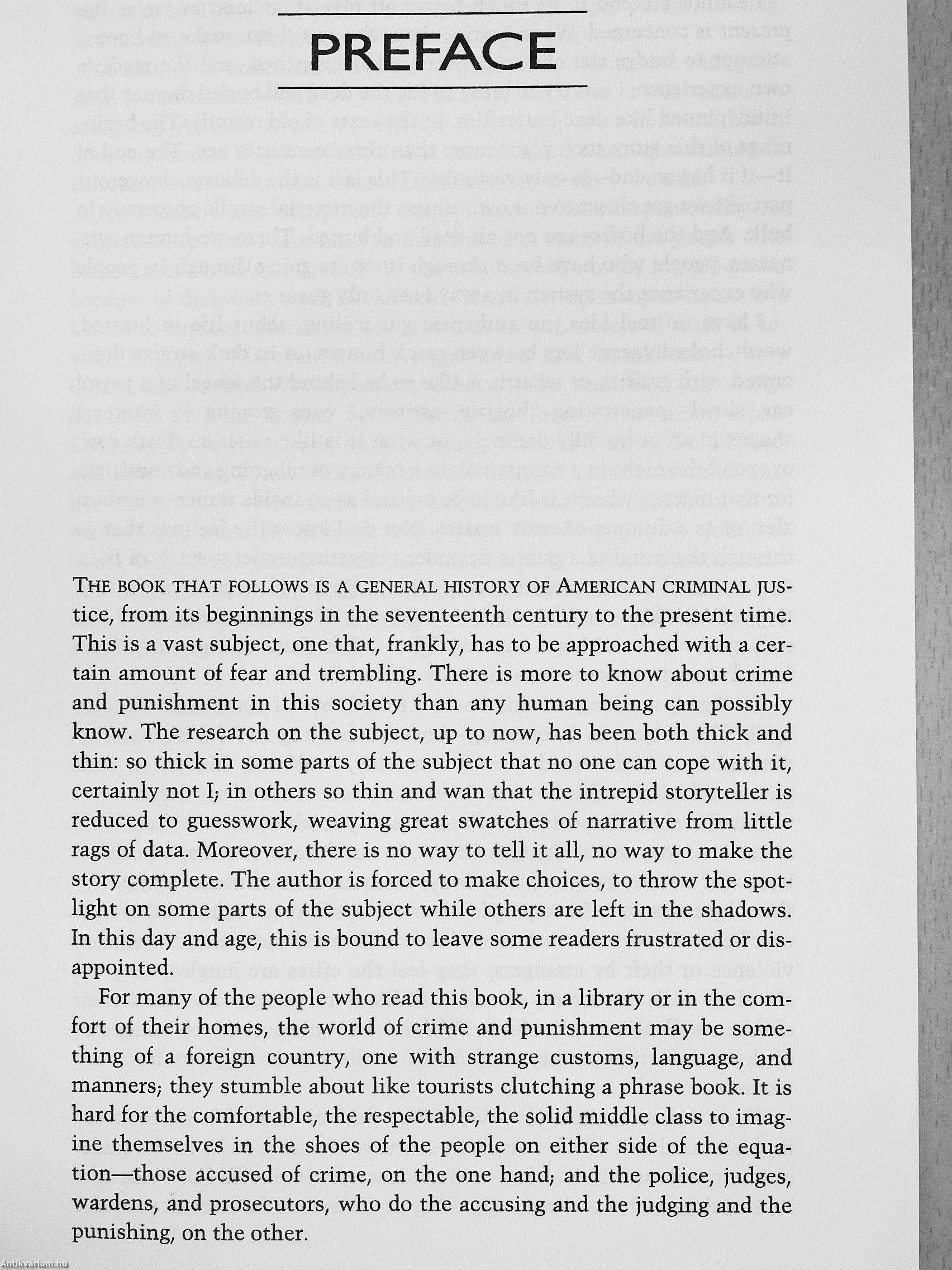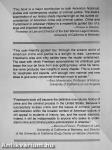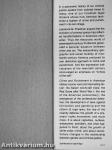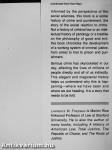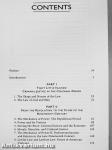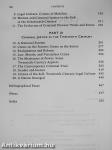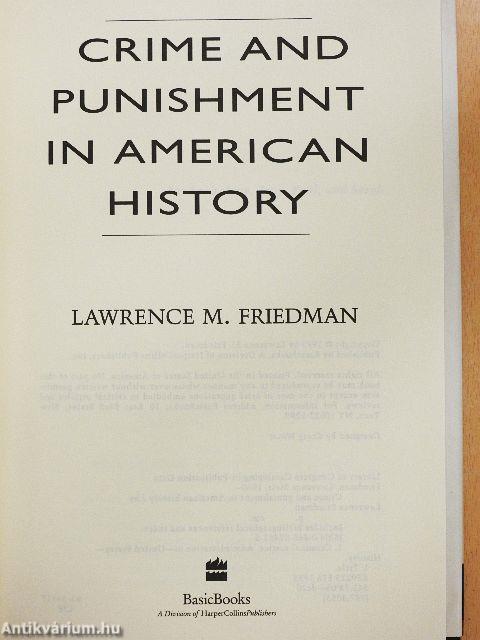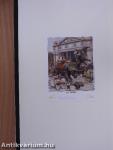1.067.317
kiadvánnyal nyújtjuk Magyarország legnagyobb antikvár könyv-kínálatát

VISSZA
A TETEJÉRE
JAVASLATOKÉszre-
vételek
Crime and Punishment in American History
| Kiadó: | BasicBooks |
|---|---|
| Kiadás helye: | New York |
| Kiadás éve: | |
| Kötés típusa: | Félvászon |
| Oldalszám: | 577 oldal |
| Sorozatcím: | |
| Kötetszám: | |
| Nyelv: | Angol |
| Méret: | 24 cm x 17 cm |
| ISBN: | 0-465-01461-5 |
naponta értesítjük a beérkező friss
kiadványokról
naponta értesítjük a beérkező friss
kiadványokról
Előszó
TovábbFülszöveg
"This book is a major contribution to both American historical studies and contemporary studies of criminal justice. The book's examination of our history sheds important light on the current circumstances of American crime and criminal justice. Crime and Punishment in American History is a masterfully guided tour of a large and important landscape." —Franklin Zimring,
Professor of Law and Director of the Earl Warren Legal Institute,
University of California at Berkeley
"This user-friendly guided tour through the arcane world of American crime and justice is a delight to read. Lawrence Friedman's wise and witty asides keep the reader entertained. The ease with which Friedman accomplishes his ambitious goal keeps this tour de force from ever getting heavy, while his narrative verve produces new insights in every chapter. This is a book for neophytes and experts, with enough new material and new ideas to give every concerned American much to ponder."
—Eric Monkkonen, Professor... Tovább
Fülszöveg
"This book is a major contribution to both American historical studies and contemporary studies of criminal justice. The book's examination of our history sheds important light on the current circumstances of American crime and criminal justice. Crime and Punishment in American History is a masterfully guided tour of a large and important landscape." —Franklin Zimring,
Professor of Law and Director of the Earl Warren Legal Institute,
University of California at Berkeley
"This user-friendly guided tour through the arcane world of American crime and justice is a delight to read. Lawrence Friedman's wise and witty asides keep the reader entertained. The ease with which Friedman accomplishes his ambitious goal keeps this tour de force from ever getting heavy, while his narrative verve produces new insights in every chapter. This is a book for neophytes and experts, with enough new material and new ideas to give every concerned American much to ponder."
—Eric Monkkonen, Professor of History, University of California at Los Angeles
"Friedman's book will become the definitive one-volume history of crime and the criminal process in the United States. Because it successfully locates crime and the issues of criminal justice administration within the broader context of American culture, it will appeal to students of history, law, and the social sciences. Indeed, it will be indispensable to anyone who seeks to understand crime and criminal justice administration in America."
—Malcolm Feeley, Professor of Law, University of California at Berkeley, and Director of the University of California Study Center at Hebrew University
ȇ
i- I'
( ','11 h '
' ».I,'.;! ( -.f
lllf ¦ V.'i 'l,, [ ¦ ( I', ' . I, I. J>
'í' I
m^mmmm
•'Ví.i'f;;.
i.i'i'),)' , I
' !¦ ,1 i
MIÉIMim
^-•^'hVi'V '' IM- I i'" ' "
il I 1; ^ ' ¦
^vV
t 1'. !
J| ! •¦!I,"' " 1 ¦
, 'i vH^ I vi" í-i'Á
V'
1'
MVl'.Jn , ' i ¦ V ' t i ' I I I 'I r.',: '
In a panoramic history of our criminal justice system from colonial times to today, one of our foremost legal thinkers shows how America fashioned a system of crime and punishment in its own image.
Lawrence M. Friedman argues that the evolution of criminal justice has reflected transformations in America's character. Thus the theocratic world of seventeenth-century Puritanism generated a peculiar equation between crime and sin. The extraordinary geographic and social mobility of nineteenth-century America produced its own distinctive approach to crime and punishment. And the expressive individualism of the twentieth century encouraged an emphasis on "crimes of the self."
Crime and Punishment in American H/sfoAy covers vast and fascinating terrain: the Salem witchcraft trials; the Red Scare after World War I; the rise of the American penitentiary; the emergence of the professional detective; the development of laws against fornication and gambling and the reform of rape laws; the rise of the insanity defense; the growth of a prisoners' rights movement; and much more. It is about vigilantes, outlaws, embezzlers, swindlers, and what happened to them; about the growth of white-collar crime; and about revolutionary changes in the relationship between gender and criminal justice.
(continued on back flap)
0993p
(continued from front flap)
Informed by the perspective of the social sciences, this bool< is a social history of crime and punishment, the story of the social reaction to crime. Not a history of criminal law or an intellectual history of penology or a treatise on the philosophy of good and evil, this book chronicles the development of a working system of criminal justice, from arrest to trial to prison and punishment.
Serious crime has skyrocketed in our day, affecting the lives of millions of people directly and all of us indirectly. This elegant and magisterial history helps us understand why this is happening—where we have been and where we are heading. It is a story that needs to be told.
Lawrence M. Friedman is Marion Rice Kirkwood Professor of Law at Stanford University. He is also the author of many books, including A History of American Law, Total Justice, The Republic of Choice, and The Roots of Justice. Vissza



